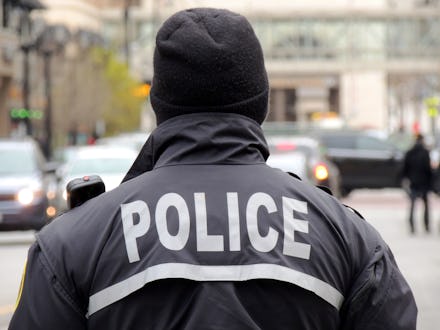This Black Professor Wrote About the Harrowing Reality of Fitting a Police Description

A one-of-a-kind knit cap and a brown blazer, or a knit cap and puffy coat?
Massachusetts College of Art and Design professor Steve Locke shared a story on his personal blog earlier today about what happened when he wore this outfit to work yesterday, an outfit that police told him matched the description of a robbery suspect in the area:
While on his way to get a burrito before work, police stopped Locke near Boston's Centre street. Locke wrote that the police officer unsnapped his gun's holster as he approached him, which prompted Locke to take his hands out of his pockets.
After being prompted with questions, Locke explained that he was on his way to grab lunch before teaching a 1:30 p.m. class and that he was on a completely different street during the time of the robbery.
Locke complied with the officer's request for identification. Locke wrote that about the knit cap he wore in the picture above, which was said to look like a knit cap the suspect was wearing. He wrote:
Barbara Sullivan made a knit cap for me. She knitted it in pinks and browns and blues and oranges and lime green. No one has a hat like this. It doesn't fit any description that anyone would have. I looked at the second cop. I clasped my hands in front of me to stop them from shaking.
Locke, while wearing his faculty ID, told the cops that he was a college professor, but the officers told him that they were bringing him to let the victim identify him.
Locke wrote of this moment:
It was at this moment that I knew that I was probably going to die. I am not being dramatic when I say this. I was not going to get into a police car. I was not going to present myself to some victim. I was not going let someone tell the cops that I was not guilty when I already told them that I had nothing to do with any robbery. I was not going to let them take me anywhere because if they did, the chance I was going to be accused of something I did not do rose exponentially. I knew this in my heart. I was not going anywhere with these cops and I was not going to let some white woman decide whether or not I was a criminal, especially after I told them that I was not a criminal. This meant that I was going to resist arrest. This meant that I was not going to let the police put their hands on me.
Something weird happens when you are on the street being detained by the police. People look at you like you are a criminal. The police are detaining you so clearly you must have done something, otherwise they wouldn't have you. No one made eye contact with me. I was hoping that someone I knew would walk down the street or come out of one of the shops or get off the 39 bus or come out of JP Licks and say to these cops, "That's Steve Locke. What the FUCK are you detaining him for?"
Locke waited on the street with the police officer while they brought the woman to identify him. While waiting, he sees a black woman in a red coat watching the action as it unfolds. Eventually, a detective comes to let Locke go. As Locke walks away, he speaks to the woman in the red coat.
"Are you ok?" She said. Her small beautiful face was lined with concern.
Once in his office, Locke wrote that he reflected on the value of his word to the police officers and whether the outfit he was wearing — the cap and quilted blazer — really looked like the suspect's cap and puffy coat. He considered the fact that this could have been the moment he died.
He ends the blog post with:
Nothing I am, nothing I do, nothing I have means anything because I fit the description.
Locke's blog post comes one year after the death of Eric Garner after being put in a chokehold by New York City police officer Daniel Pantaleo. A grand jury later declined to press charges against Pantaleo for the incident, which was caught on video. Garner's death, as well as the death of Sandra Bland and many others nationwide, has sparked a recent conversation about police brutality, especially against black Americans.